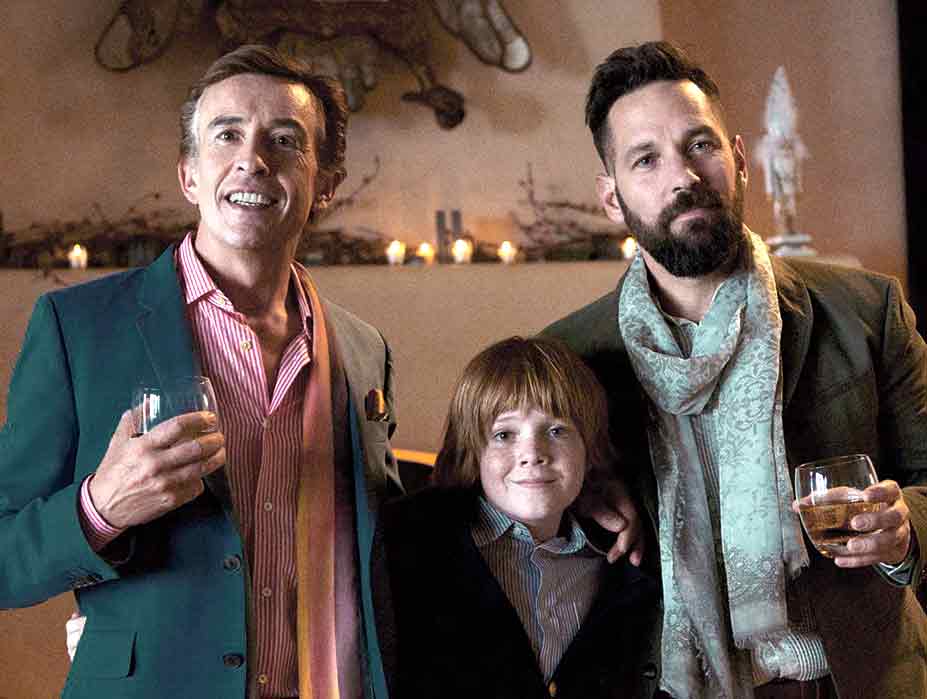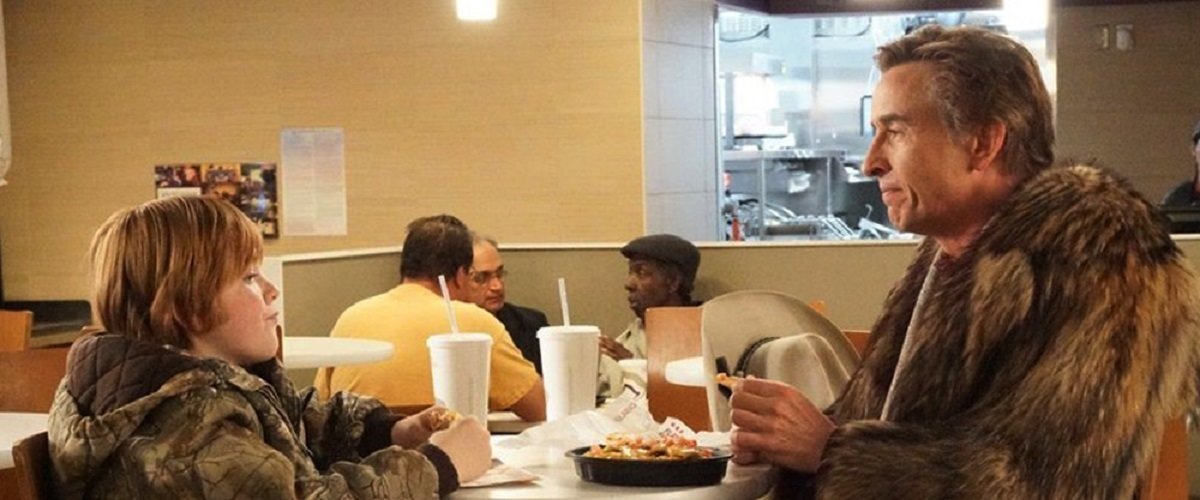On the photo above you can see Erasmus and Paul. They are a bickering gay couple with an extravagant life. Erasmus is a demanding, popular celebrity who hosts culinary TV-shows and writes cookingbooks. Paul is his insecure partner. Their lives are turned upside down when a ten-year-old boy shows up. He is the grandson of Erasmus. Neither Paul nor Erasmus are ready to give up their extravagant lifestyle in order to be parents, but this little child has something to teach them about the value of family. View the trailer below:
I laughed so hard during this hilarious, yet moving film! And despite the absolute goofy and the so-called “non-parenting” of the two men, this film can teach us parents 3 wonderful things about parenthood!
1. LAUGH WHEN YOU FEEL IT
The boy Bill gives at one point a presentation in front of the class, about being gay. In it he says: “Someone who is homosexual can never be called one of the 3 following words”. He then mentions 3 words in the class, including “butt fucker”. The whole class laughs. The teacher is in shock and admonishes the boy after every word to stop saying another word.
In the scene afterwards, the teacher sits with Erasmus and Paul at a table, to discuss what has happened in class. The 2 laugh so loud when they hear the story. They roll over the floor laughing at hearing Bill’s speech and the words he has used. The teacher looks startled at these two men and admonish the two men that this is a serious matter. But the two men just can’t stop laughing.
What do I think of this? Should you follow the teacher’s advice? Or react like Erasmus and Paul? It is one of the most persistent thoughts in society, that when we really want to teach in parenting, it must be serious business and we must put on our “serious parenting face”. Recently, a mother also posted something in a Facebook group. A meme with the text “The hardest part of parenting is to hold your laughter when your child does something that is not allowed”.
This idea, that children do not respect us or do not listen when we do not put on a kind of serious mask, stems from parenting books from the 1800s. Here we are, 200 years later and we have faithfully passed on this idea from generation to generation, without even checking whether it is right at all.
My response? Do as Erasmus and Paul do in the movie! Do not keep your laughter! Why? Often when children use these type of words in the first instance, it is innocent and experimental, as is also the case in the film. Prohibiting makes it suddenly “wrong” and therefore also more exciting and attractive.
In addition, prohibition and strictness do not work; it stimulates children to be “sneaky” and to lie. The behavior remains, but it usually takes place out of our sight. How many of us have had such a ban from our parents? Yet, most of us can scold now and then like an old sailor! At least I can. So there is absolutely no point in dealing with it like the teacher in the movie does.
Moreover, when we want to teach something to children, they learn better when we are our authentic selves. What I mean by that is that when we play some sort of “adulty-ish role”, while we actually want to laugh, it doesn’t feel honest to them. And they will more likely not take our message from us, as opposed to when they feel that we are standing behind our message + are at the same time feeling in connection with them, rather than hanging above them as a all knowing half-gods. When we are authentically connected to ourselves and therefore also connected to our child, our message comes across much faster.
So if you do not want your child to use certain ‘bad’ words, there are many more effective ways than putting on a serious face and lecturing your child. Ways that are not only more effective, but also waaay more fun than playing the serious parenting role; namely, ways where you can be yourself and playfully discourage the cursing. And this starts with allowing yourself to laugh, when you feel you have to laugh. So thanks Erasmus and Paul for this wonderful example!
2. Meeting everyones needs
When the young boy Bill arrives at the house of Erasmus and Paul, the two do not feel at all like taking care of a child. In that moment they are even partying with adults only. The visit of the little Bill slightly overthrows them. When at one point, the guests spontaneously decide to go home, so that the couple can have a private moment with the boy, Erasmus and Paul are completely disappointed! Raising a child and guests leaving the house? End of the party? No way!
And even though it may absolutely not look like it, there are some great examples in parenting here! First of all, Erasmus and Bill are not ashamed of their feelings that they do not feel like parenting the boy in that moment. Second, they do not repress their feelings, so that their inner emotional bomb will burst at any given moment towards the child. They express their frustration directly AND also towards each other, not at Bill. Third: They do not just express their frustration (“I do not like it”), they openly express how much they dislike it. Finally, they also share what they actually want in their heart, without shame and guilt; namely, to continue their party. They even honour their wish, instead of feeling guilty over it.
Since Bill has appeared at their house with only a white plastic bag containing a Bible, some money-bills and a bag of coke (yes, coke), Erasmus and Bill decide to solve the situation as follows: they pass Bill to the trusted housekeeper, who takes him to Taco Bell to eat something. Erasmus then screams: “People! There is coke and a birthday cake!” and all the guests flow back into the house, up to the dance floor, where they all go wild.
It is hilarious. But this solution is also a wonderful example. The guys decide not to set aside all their own quirky desires and do not to condemn themselves about their desires for a party. They do not try to be “those good parents according to a moralistic set of rules”. The film thus sails away from moralizing, BUT does NOT sail away from safety. Erasmus and Paul might like to drink and have a party, they do not use the coke themselves. They also do not deal drugs like Bill’s father does.
So, they look at their own needs AND those of the boy. And then meet everyone’s needs. Perhaps a bit eccentric and not entirely according to the standard parenting-plan, whatever that may be, but they do it. The boy Bill has been met in his need for safety and food that he likes (they send Bill with their trusted householder to the Taco Bell) AND at the same time they provide their own need to continue with the party and connect and dance with their friends! Everyone happy.
3. Trust your child with food
In the beginning, little Bill just wants to eat Taco Bell. And only eat that, means only eat that. Every parent’s nightmare: Taco Bell for breakfast, lunch and dinner. Paul and Erasmus do not like it either, because they are used to eating highly culinary delights, but they are clueless in how they can get the boy to eat their healthy, tasty food. The only thing the boy seems to want is to eat from Taco Bell. The men do not want the boy to starve. But where most parents would respond with bribes of candy and threats, Paul drives up and down every day to provide Bill with his Taco Bell food. Hilarious! At first it seems that Erasmus and Paul are not making anything from parenthood.
But if you look a bit further, you realize that it is slowly becoming clear that there is a deeper layer to it all. Bill’s mother appears to have been addicted to drugs and one day she was so high that she jumped out of the window and died. Bill was there. His father is addicted to alcohol and sells drugs. He ends up in jail. Bill is used to having no certainty and does not want to fully ‘land’ in the life of Erasmus and Paul. He doesn’t trust it. He is anxiously clinging to something familiar after all changes; Taco Bell. He may also want to see if the two men can be trusted and will really take care of him. In that sense, Taco Bell is also a test of whether Erasmus and Paul really love him.
And what Erasmus and Paul do fantastically, is giving the boy some space here! They rely on his directions of what he wants to eat. They do not or hardly moralise Bill. So then the hilarious and absurd situation in the film happens, where the boy eats Taco Bell 3 times a day, for weeks. There’s a beautiful scene in which the culinary chef Erasmus sits at one point with Bill in the Taco Bell cafetaria and says that it is one of the most beautiful moments in his life. It clearly shows that this “misbehaviour” is not about the food itself and the morality around food. The scene clearly shows what it’s all about: the connection. The acceptance. The love between Erasmus and his grandson.
If you understand this, it is also not so surprising how Bill responds when Paul tries to get Bill to eat some sweets, instead of Taco Bell, so that Paul does not have to drive to the fast-food chain. Bill replies that “Sweets are for desert!” And he repeats again: “I want to eat Taco Bell for lunch!” This shows that the whole Taco Bell debacle is not so much about eating unhealthy stuff that “is not allowed”. It is also not about who gets his way, nor about setting limits, nor about eating healthy. It is something deeper than that. In essence, the film also says: parenting is about something deeper than that.
At the end of the film Erasmus and Paul drive home with Bill in the car. Bill is clearly happy that he now lives with Erasmus and Paul. He has landed in his new life. He trusts both gentlemen. Erasmus and Paul are in the front of the car and argue about what they will eat for dinner. “Why do not you ask me?”, asks Bill. “Because you only want Taco Bell,” replies one of the two men. And then Bill answers miraculously: “No, I want pork tenderloin with caramelized apples and ginger.”
This answer sounds unbelievable for most parents. But this is absolutely how it works. Because what happens? Bill struggled with feelings and uncertainties, but now no longer has to cling to Taco Bell. He has emotionally landed at the home of Erasmus and Paul, feels at home and feels safe. And he feels the confirmation that they love him unconditionally. That he can be himself. That he has freedom of choice. That they accept him and they are willing to come into his world, to understand him. He no longer has to “test” them. AND! He has also seen at their place what ‘good’ food looks like and he can now enjoy it himself.
It is such a wonderful example that shows it doesn’t work when you only focus on the food and eating-behaviour itself, but that it is more useful or effective when you focus on what lies beneath the eating behavior and act from trust and connection. These are also my interventions in 1-on-1 guidance with parents and in my workshops. So .. thanks Erasmus and Paul for this wonderful example!
Conclusion
The film plays beautifully with all the prohibitions that we impose on ourselves as parents out of shame and guilt. Which descended from ideas from 1800-something, that dictated “good parenting”. For example, Erasmus is sitting behind the steering-wheel of his car with a glass of whiskey, but he is not drunk. In contrast to Bill’s father, who smashes a bottle of liquor while he sits in the car with Bill and he swings dangerously back and forth (and makes a clash). It’s wiser not to drink and drive obviously, but what I see in this film is that it really makes us wonder about how strict we moralise and how often we are captured in good and bad thinking, shame and guilt.
For me, the film shows again and again what it’s really all about in parenting: not the black-and-white morality of what good or bad behaviour literally looks like in a dogmatic image of parenting, when it comes to behaviour of either parents or child. The film shows for me the loosening of that entrenched morality, of dogmatic thinking. The film shows for me that parenting is about a much deeper layer, than what the eye can see.
This deeper layer is not about superficial judgments of right and wrong behavior, but is about the relationship between people, the connection with ourselves, with each other, with our child. What lies underneath behaviour, what drives us. Away from shame and guilt; Acceptance of ourselves, our child, trust, autonomy, safety, love and warmth. That is an Ideal Home.
Truly a beautiful film with so much humor! Do you want to have a good laugh and also get a bit more out of your own guilt and shame around parenting? Then watch the parenting movie ‘Ideal Home’!
Aware Parenting is based on the work of Dr. Aletha Solter. She is a developmental psychologist, international speaker, consultant, and founder of the Aware Parenting Institute. Her books have been translated into many languages, and she is recognized internationally as an expert on attachment, trauma, and non-punitive discipline.For more information, please see Dr. Aletha Solter’s books, The Aware Baby, Cooperative and Connected, Tears and Tantrums, Raising Drug-Free Kids, and Attachment Play. About the author: Hi! My name is Chris Muller, MSc, BTA. I am a psychologist, counselor in Transactional Analysis, Aware Parenting instructor (level 2) regional coordinator the Netherlands and mother. For 10 years I provide support to parents through training, the Aware Parenting Education and 1-on-1 guidance. With a lot of love I help you to treat children AND yourself with love and respect. It is my passion that you experience more joy and more connection with your child AND with yourself! X 
About the author:

Do you want parenting support?
UPCOMING TRAINING IN LONDON SEPTEMBER 30:

Would you like to receive my Free Book Guide? Free Bookguide
12 tips + explanation
for almost all parenting struggleswithout time-outs, rewards or sleeptraining
Would you like to receive free tips & updates by email?
Then fill in your email!


